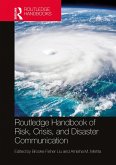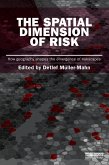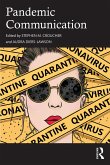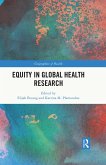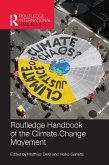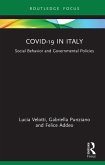Routledge Handbook of Risk, Crisis, and Disaster Communication (eBook, ePUB)
Redaktion: Liu, Brooke Fisher; Mehta, Amisha M.
45,95 €
45,95 €
inkl. MwSt.
Sofort per Download lieferbar

23 °P sammeln
45,95 €
Als Download kaufen

45,95 €
inkl. MwSt.
Sofort per Download lieferbar

23 °P sammeln
Jetzt verschenken
Alle Infos zum eBook verschenken
45,95 €
inkl. MwSt.
Sofort per Download lieferbar
Alle Infos zum eBook verschenken

23 °P sammeln
Routledge Handbook of Risk, Crisis, and Disaster Communication (eBook, ePUB)
Redaktion: Liu, Brooke Fisher; Mehta, Amisha M.
- Format: ePub
- Merkliste
- Auf die Merkliste
- Bewerten Bewerten
- Teilen
- Produkt teilen
- Produkterinnerung
- Produkterinnerung

Bitte loggen Sie sich zunächst in Ihr Kundenkonto ein oder registrieren Sie sich bei
bücher.de, um das eBook-Abo tolino select nutzen zu können.
Hier können Sie sich einloggen
Hier können Sie sich einloggen
Sie sind bereits eingeloggt. Klicken Sie auf 2. tolino select Abo, um fortzufahren.

Bitte loggen Sie sich zunächst in Ihr Kundenkonto ein oder registrieren Sie sich bei bücher.de, um das eBook-Abo tolino select nutzen zu können.
This Handbook provides a comprehensive overview of core concepts, research, and practice in risk, crisis, and disaster communication.
- Geräte: eReader
- mit Kopierschutz
- eBook Hilfe
Andere Kunden interessierten sich auch für
![Routledge Handbook of Risk, Crisis, and Disaster Communication (eBook, PDF) Routledge Handbook of Risk, Crisis, and Disaster Communication (eBook, PDF)]() Routledge Handbook of Risk, Crisis, and Disaster Communication (eBook, PDF)45,95 €
Routledge Handbook of Risk, Crisis, and Disaster Communication (eBook, PDF)45,95 €![The Spatial Dimension of Risk (eBook, ePUB) The Spatial Dimension of Risk (eBook, ePUB)]() The Spatial Dimension of Risk (eBook, ePUB)49,95 €
The Spatial Dimension of Risk (eBook, ePUB)49,95 €![Pandemic Communication (eBook, ePUB) Pandemic Communication (eBook, ePUB)]() Pandemic Communication (eBook, ePUB)40,95 €
Pandemic Communication (eBook, ePUB)40,95 €![Equity in Global Health Research (eBook, ePUB) Equity in Global Health Research (eBook, ePUB)]() Equity in Global Health Research (eBook, ePUB)41,95 €
Equity in Global Health Research (eBook, ePUB)41,95 €![The Handbook of International Trends in Environmental Communication (eBook, ePUB) The Handbook of International Trends in Environmental Communication (eBook, ePUB)]() The Handbook of International Trends in Environmental Communication (eBook, ePUB)91,95 €
The Handbook of International Trends in Environmental Communication (eBook, ePUB)91,95 €![Routledge Handbook of the Climate Change Movement (eBook, ePUB) Routledge Handbook of the Climate Change Movement (eBook, ePUB)]() Routledge Handbook of the Climate Change Movement (eBook, ePUB)57,95 €
Routledge Handbook of the Climate Change Movement (eBook, ePUB)57,95 €![COVID-19 in Italy (eBook, ePUB) COVID-19 in Italy (eBook, ePUB)]() Lucia VelottiCOVID-19 in Italy (eBook, ePUB)23,95 €
Lucia VelottiCOVID-19 in Italy (eBook, ePUB)23,95 €-
-
-
This Handbook provides a comprehensive overview of core concepts, research, and practice in risk, crisis, and disaster communication.
Dieser Download kann aus rechtlichen Gründen nur mit Rechnungsadresse in A, B, BG, CY, CZ, D, DK, EW, E, FIN, F, GR, HR, H, IRL, I, LT, L, LR, M, NL, PL, P, R, S, SLO, SK ausgeliefert werden.
Produktdetails
- Produktdetails
- Verlag: Taylor & Francis eBooks
- Seitenzahl: 432
- Erscheinungstermin: 30. Mai 2024
- Englisch
- ISBN-13: 9781040019863
- Artikelnr.: 70583540
- Verlag: Taylor & Francis eBooks
- Seitenzahl: 432
- Erscheinungstermin: 30. Mai 2024
- Englisch
- ISBN-13: 9781040019863
- Artikelnr.: 70583540
- Herstellerkennzeichnung Die Herstellerinformationen sind derzeit nicht verfügbar.
Brooke Fisher Liu is a professor in the Department of Communication at the University of Maryland. Her research investigates how government messages, media, and interpersonal communication can contribute to individual and community resilience from disasters. Dr. Liu's research has been supported by a variety of US government agencies including the Food and Drug Administration, National Science Foundation, Department of Homeland Security, and the National Oceanic and Atmospheric Administration. She is the co-founder and former editor of the Journal of International Crisis and Risk Communication Research. Dr. Liu co-founded and co-directs the University of Maryland Pandemic Readiness Initiative. Amisha Mehta is a Professor in the School of Advertising, Marketing and Public Relations, Faculty of Business and Law at QUT, Brisbane, Australia. She specializes in risk and crisis communication and trust, applying this expertise in emerging industries and corporate, health, and natural hazard emergencies. Amisha actively works with industry and her research has been translated into national policy. She has received a number of individual, team, and national awards for teaching and research.
Handbook Introduction: Laying the Foundation for Risk, Crisis, and Disaster Communication Research and Practice
Brooke Fisher Liu and Amisha Mehta
Part I: Foundations
Section I Introduction
Brooke Fisher Liu and Amisha Mehta
1. Theories of Crisis Communication
Sora Kim, Emma K. Bishop, and Charles Yu Yang
2. Expanding Theories of Risk and Disaster Communication: Integrating Instructional Communication
Timothy L. Sellnow and Deanna D. Sellnow
3. The "Gray" in Discerning Right from Wrong: Navigating Ethical Obligations Through Relativism in Crisis and Disaster Communication
Olivia Truban, Victoria McDermott, and Matthew W. Seeger
4. Teaching Crisis Communication: History, Traditions, and Future Opportunities
Olivia Truban and Brooke Fisher Liu
5. Best Practices in Crisis and Disaster Communication
Matthew W. Seeger and Andreas Schwarz
Part II: Communicating About Climate and Weather
Section II Introduction
Amisha Mehta and Brooke Fisher Liu
6. Building and Maintaining Relationships that Protect Communities: The Importance of Relationships within the Weather Enterprise
Anita Atwell Seate
7. Examining the Role of Corporate Climate Change Communications
Rosalynn A. Vasquez
8. Visual Design as a Facilitator of Risk Observance: Optimizing Message Reception and Memorability for Increased Public Engagement
Amitabh Verma, Yan Jin, and Brooke Fisher Liu
9. Alerts and Warnings in Emergency Communication
Erica D. Kuligowski, Jeannette Sutton, Michele Olson, and Lauren B. Cain
10. Community Disaster Resilience and Communication: Models, Existing Research, and Next Steps
Lindsey P. Vázquez, Ernest A. Eshun, and J. Brian Houston
11. Communicating About Weather in Australia: Leveraging Intersections Between Emergency Operations and the Frontline to Guide Future Practice
Kath Ryan, Major General Jake Ellwood, and Amisha Mehta
Part III: Communicating About Ongoing and Novel Risks, Crises, and Disasters
Section III Introduction
Amisha Mehta and Brooke Fisher Liu
12. Ripples, Waves, and Riptides: Reconceptualizing Wicked, Novel, and Ongoing Crises as Prolonged Crises
Audra Diers-Lawson and Grace Omondi
13. Organizations and the Crisis of Trust: The Challenges and Opportunities of Declining Institutional and Informational Trust
Toni G. L. A. van der Meer, Yan Jin, Anna Brosius, Victoria Marie McDermott, Xuerong Lu, and Amisha Mehta
14. Advancing Methodologies for Hurricane Disaster Research Using Social Media Data
Emina Herovic, Caerwyn Hartten, Emily Walpole, Katherine Johnson, Cameron Busser, and the National Institute of Standards and Technology
15. Longitudinal Studies of Risk Perceptions and Behavioral Responses for Natural Hazards
Julie L. Demuth, Rebecca E. Morss, Gabrielle Wong-Parodi, Andrea Schumacher, Hugh Walpole, and Natalie Herbert
16. From a Characteristic to a Construct: Exploring the Cascading Effects of (In)Consistent Messages
Castle Williamsberg and Gina Eosco
17. When Rumors Take Hold in Crisis Communication: Statements by Politicians and Authorities during Crises
Henrik Olinder
Part IV: Communicating with Diverse Publics and Audiences
Section IV Introduction
Brooke Fisher Liu and Amisha Mehta
18. Health Literacy and Community Engagement Insights Applied to Public Health Emergencies Can Ensure Equitable, Useful Information for Protective Actions
Cynthia Baur and Christine E. Prue
19. Integrating Mental Health in Disaster Communication Theory and Practice
J. Suzanne Horsley and Daphne S. Cain
20. Internal Communication
An-Sofie Claeys and Ellen Soens
21. Why and How We Trust: A Systematic Review of the Role Played by Trust in Crisis, Risk, and Disaster Communication Studies in Eastern and Western Cultures
Yi-Hui Christine Huang, Jie Sun, Ruoheng Liu, Qinxian Cai, Haodong Liu, and Leyi Zhang
22. Praxis, Opportunities, and Recommendations: Reflecting on Political Crisis Communication in Africa
Nana Kwame Osei Fordjour, Godwin Etse Sikanku, and Eric Opoku Mensah
23. Migrant Populations
Bengt Johansson and James Rhys Edwards
24. Bridging Research and Practice for Impact: Behavioral Science in Action for Effective Risk, Crisis, and Disaster Communication
JungKyu Rhys Lim and Jimena Llopis
Handbook Conclusion: Trajectory of Future Research and Practice in Risk, Crisis, and Disaster Communication
Amisha Mehta and Brooke Fisher Liu
Brooke Fisher Liu and Amisha Mehta
Part I: Foundations
Section I Introduction
Brooke Fisher Liu and Amisha Mehta
1. Theories of Crisis Communication
Sora Kim, Emma K. Bishop, and Charles Yu Yang
2. Expanding Theories of Risk and Disaster Communication: Integrating Instructional Communication
Timothy L. Sellnow and Deanna D. Sellnow
3. The "Gray" in Discerning Right from Wrong: Navigating Ethical Obligations Through Relativism in Crisis and Disaster Communication
Olivia Truban, Victoria McDermott, and Matthew W. Seeger
4. Teaching Crisis Communication: History, Traditions, and Future Opportunities
Olivia Truban and Brooke Fisher Liu
5. Best Practices in Crisis and Disaster Communication
Matthew W. Seeger and Andreas Schwarz
Part II: Communicating About Climate and Weather
Section II Introduction
Amisha Mehta and Brooke Fisher Liu
6. Building and Maintaining Relationships that Protect Communities: The Importance of Relationships within the Weather Enterprise
Anita Atwell Seate
7. Examining the Role of Corporate Climate Change Communications
Rosalynn A. Vasquez
8. Visual Design as a Facilitator of Risk Observance: Optimizing Message Reception and Memorability for Increased Public Engagement
Amitabh Verma, Yan Jin, and Brooke Fisher Liu
9. Alerts and Warnings in Emergency Communication
Erica D. Kuligowski, Jeannette Sutton, Michele Olson, and Lauren B. Cain
10. Community Disaster Resilience and Communication: Models, Existing Research, and Next Steps
Lindsey P. Vázquez, Ernest A. Eshun, and J. Brian Houston
11. Communicating About Weather in Australia: Leveraging Intersections Between Emergency Operations and the Frontline to Guide Future Practice
Kath Ryan, Major General Jake Ellwood, and Amisha Mehta
Part III: Communicating About Ongoing and Novel Risks, Crises, and Disasters
Section III Introduction
Amisha Mehta and Brooke Fisher Liu
12. Ripples, Waves, and Riptides: Reconceptualizing Wicked, Novel, and Ongoing Crises as Prolonged Crises
Audra Diers-Lawson and Grace Omondi
13. Organizations and the Crisis of Trust: The Challenges and Opportunities of Declining Institutional and Informational Trust
Toni G. L. A. van der Meer, Yan Jin, Anna Brosius, Victoria Marie McDermott, Xuerong Lu, and Amisha Mehta
14. Advancing Methodologies for Hurricane Disaster Research Using Social Media Data
Emina Herovic, Caerwyn Hartten, Emily Walpole, Katherine Johnson, Cameron Busser, and the National Institute of Standards and Technology
15. Longitudinal Studies of Risk Perceptions and Behavioral Responses for Natural Hazards
Julie L. Demuth, Rebecca E. Morss, Gabrielle Wong-Parodi, Andrea Schumacher, Hugh Walpole, and Natalie Herbert
16. From a Characteristic to a Construct: Exploring the Cascading Effects of (In)Consistent Messages
Castle Williamsberg and Gina Eosco
17. When Rumors Take Hold in Crisis Communication: Statements by Politicians and Authorities during Crises
Henrik Olinder
Part IV: Communicating with Diverse Publics and Audiences
Section IV Introduction
Brooke Fisher Liu and Amisha Mehta
18. Health Literacy and Community Engagement Insights Applied to Public Health Emergencies Can Ensure Equitable, Useful Information for Protective Actions
Cynthia Baur and Christine E. Prue
19. Integrating Mental Health in Disaster Communication Theory and Practice
J. Suzanne Horsley and Daphne S. Cain
20. Internal Communication
An-Sofie Claeys and Ellen Soens
21. Why and How We Trust: A Systematic Review of the Role Played by Trust in Crisis, Risk, and Disaster Communication Studies in Eastern and Western Cultures
Yi-Hui Christine Huang, Jie Sun, Ruoheng Liu, Qinxian Cai, Haodong Liu, and Leyi Zhang
22. Praxis, Opportunities, and Recommendations: Reflecting on Political Crisis Communication in Africa
Nana Kwame Osei Fordjour, Godwin Etse Sikanku, and Eric Opoku Mensah
23. Migrant Populations
Bengt Johansson and James Rhys Edwards
24. Bridging Research and Practice for Impact: Behavioral Science in Action for Effective Risk, Crisis, and Disaster Communication
JungKyu Rhys Lim and Jimena Llopis
Handbook Conclusion: Trajectory of Future Research and Practice in Risk, Crisis, and Disaster Communication
Amisha Mehta and Brooke Fisher Liu
Handbook Introduction: Laying the Foundation for Risk, Crisis, and Disaster Communication Research and Practice
Brooke Fisher Liu and Amisha Mehta
Part I: Foundations
Section I Introduction
Brooke Fisher Liu and Amisha Mehta
1. Theories of Crisis Communication
Sora Kim, Emma K. Bishop, and Charles Yu Yang
2. Expanding Theories of Risk and Disaster Communication: Integrating Instructional Communication
Timothy L. Sellnow and Deanna D. Sellnow
3. The "Gray" in Discerning Right from Wrong: Navigating Ethical Obligations Through Relativism in Crisis and Disaster Communication
Olivia Truban, Victoria McDermott, and Matthew W. Seeger
4. Teaching Crisis Communication: History, Traditions, and Future Opportunities
Olivia Truban and Brooke Fisher Liu
5. Best Practices in Crisis and Disaster Communication
Matthew W. Seeger and Andreas Schwarz
Part II: Communicating About Climate and Weather
Section II Introduction
Amisha Mehta and Brooke Fisher Liu
6. Building and Maintaining Relationships that Protect Communities: The Importance of Relationships within the Weather Enterprise
Anita Atwell Seate
7. Examining the Role of Corporate Climate Change Communications
Rosalynn A. Vasquez
8. Visual Design as a Facilitator of Risk Observance: Optimizing Message Reception and Memorability for Increased Public Engagement
Amitabh Verma, Yan Jin, and Brooke Fisher Liu
9. Alerts and Warnings in Emergency Communication
Erica D. Kuligowski, Jeannette Sutton, Michele Olson, and Lauren B. Cain
10. Community Disaster Resilience and Communication: Models, Existing Research, and Next Steps
Lindsey P. Vázquez, Ernest A. Eshun, and J. Brian Houston
11. Communicating About Weather in Australia: Leveraging Intersections Between Emergency Operations and the Frontline to Guide Future Practice
Kath Ryan, Major General Jake Ellwood, and Amisha Mehta
Part III: Communicating About Ongoing and Novel Risks, Crises, and Disasters
Section III Introduction
Amisha Mehta and Brooke Fisher Liu
12. Ripples, Waves, and Riptides: Reconceptualizing Wicked, Novel, and Ongoing Crises as Prolonged Crises
Audra Diers-Lawson and Grace Omondi
13. Organizations and the Crisis of Trust: The Challenges and Opportunities of Declining Institutional and Informational Trust
Toni G. L. A. van der Meer, Yan Jin, Anna Brosius, Victoria Marie McDermott, Xuerong Lu, and Amisha Mehta
14. Advancing Methodologies for Hurricane Disaster Research Using Social Media Data
Emina Herovic, Caerwyn Hartten, Emily Walpole, Katherine Johnson, Cameron Busser, and the National Institute of Standards and Technology
15. Longitudinal Studies of Risk Perceptions and Behavioral Responses for Natural Hazards
Julie L. Demuth, Rebecca E. Morss, Gabrielle Wong-Parodi, Andrea Schumacher, Hugh Walpole, and Natalie Herbert
16. From a Characteristic to a Construct: Exploring the Cascading Effects of (In)Consistent Messages
Castle Williamsberg and Gina Eosco
17. When Rumors Take Hold in Crisis Communication: Statements by Politicians and Authorities during Crises
Henrik Olinder
Part IV: Communicating with Diverse Publics and Audiences
Section IV Introduction
Brooke Fisher Liu and Amisha Mehta
18. Health Literacy and Community Engagement Insights Applied to Public Health Emergencies Can Ensure Equitable, Useful Information for Protective Actions
Cynthia Baur and Christine E. Prue
19. Integrating Mental Health in Disaster Communication Theory and Practice
J. Suzanne Horsley and Daphne S. Cain
20. Internal Communication
An-Sofie Claeys and Ellen Soens
21. Why and How We Trust: A Systematic Review of the Role Played by Trust in Crisis, Risk, and Disaster Communication Studies in Eastern and Western Cultures
Yi-Hui Christine Huang, Jie Sun, Ruoheng Liu, Qinxian Cai, Haodong Liu, and Leyi Zhang
22. Praxis, Opportunities, and Recommendations: Reflecting on Political Crisis Communication in Africa
Nana Kwame Osei Fordjour, Godwin Etse Sikanku, and Eric Opoku Mensah
23. Migrant Populations
Bengt Johansson and James Rhys Edwards
24. Bridging Research and Practice for Impact: Behavioral Science in Action for Effective Risk, Crisis, and Disaster Communication
JungKyu Rhys Lim and Jimena Llopis
Handbook Conclusion: Trajectory of Future Research and Practice in Risk, Crisis, and Disaster Communication
Amisha Mehta and Brooke Fisher Liu
Brooke Fisher Liu and Amisha Mehta
Part I: Foundations
Section I Introduction
Brooke Fisher Liu and Amisha Mehta
1. Theories of Crisis Communication
Sora Kim, Emma K. Bishop, and Charles Yu Yang
2. Expanding Theories of Risk and Disaster Communication: Integrating Instructional Communication
Timothy L. Sellnow and Deanna D. Sellnow
3. The "Gray" in Discerning Right from Wrong: Navigating Ethical Obligations Through Relativism in Crisis and Disaster Communication
Olivia Truban, Victoria McDermott, and Matthew W. Seeger
4. Teaching Crisis Communication: History, Traditions, and Future Opportunities
Olivia Truban and Brooke Fisher Liu
5. Best Practices in Crisis and Disaster Communication
Matthew W. Seeger and Andreas Schwarz
Part II: Communicating About Climate and Weather
Section II Introduction
Amisha Mehta and Brooke Fisher Liu
6. Building and Maintaining Relationships that Protect Communities: The Importance of Relationships within the Weather Enterprise
Anita Atwell Seate
7. Examining the Role of Corporate Climate Change Communications
Rosalynn A. Vasquez
8. Visual Design as a Facilitator of Risk Observance: Optimizing Message Reception and Memorability for Increased Public Engagement
Amitabh Verma, Yan Jin, and Brooke Fisher Liu
9. Alerts and Warnings in Emergency Communication
Erica D. Kuligowski, Jeannette Sutton, Michele Olson, and Lauren B. Cain
10. Community Disaster Resilience and Communication: Models, Existing Research, and Next Steps
Lindsey P. Vázquez, Ernest A. Eshun, and J. Brian Houston
11. Communicating About Weather in Australia: Leveraging Intersections Between Emergency Operations and the Frontline to Guide Future Practice
Kath Ryan, Major General Jake Ellwood, and Amisha Mehta
Part III: Communicating About Ongoing and Novel Risks, Crises, and Disasters
Section III Introduction
Amisha Mehta and Brooke Fisher Liu
12. Ripples, Waves, and Riptides: Reconceptualizing Wicked, Novel, and Ongoing Crises as Prolonged Crises
Audra Diers-Lawson and Grace Omondi
13. Organizations and the Crisis of Trust: The Challenges and Opportunities of Declining Institutional and Informational Trust
Toni G. L. A. van der Meer, Yan Jin, Anna Brosius, Victoria Marie McDermott, Xuerong Lu, and Amisha Mehta
14. Advancing Methodologies for Hurricane Disaster Research Using Social Media Data
Emina Herovic, Caerwyn Hartten, Emily Walpole, Katherine Johnson, Cameron Busser, and the National Institute of Standards and Technology
15. Longitudinal Studies of Risk Perceptions and Behavioral Responses for Natural Hazards
Julie L. Demuth, Rebecca E. Morss, Gabrielle Wong-Parodi, Andrea Schumacher, Hugh Walpole, and Natalie Herbert
16. From a Characteristic to a Construct: Exploring the Cascading Effects of (In)Consistent Messages
Castle Williamsberg and Gina Eosco
17. When Rumors Take Hold in Crisis Communication: Statements by Politicians and Authorities during Crises
Henrik Olinder
Part IV: Communicating with Diverse Publics and Audiences
Section IV Introduction
Brooke Fisher Liu and Amisha Mehta
18. Health Literacy and Community Engagement Insights Applied to Public Health Emergencies Can Ensure Equitable, Useful Information for Protective Actions
Cynthia Baur and Christine E. Prue
19. Integrating Mental Health in Disaster Communication Theory and Practice
J. Suzanne Horsley and Daphne S. Cain
20. Internal Communication
An-Sofie Claeys and Ellen Soens
21. Why and How We Trust: A Systematic Review of the Role Played by Trust in Crisis, Risk, and Disaster Communication Studies in Eastern and Western Cultures
Yi-Hui Christine Huang, Jie Sun, Ruoheng Liu, Qinxian Cai, Haodong Liu, and Leyi Zhang
22. Praxis, Opportunities, and Recommendations: Reflecting on Political Crisis Communication in Africa
Nana Kwame Osei Fordjour, Godwin Etse Sikanku, and Eric Opoku Mensah
23. Migrant Populations
Bengt Johansson and James Rhys Edwards
24. Bridging Research and Practice for Impact: Behavioral Science in Action for Effective Risk, Crisis, and Disaster Communication
JungKyu Rhys Lim and Jimena Llopis
Handbook Conclusion: Trajectory of Future Research and Practice in Risk, Crisis, and Disaster Communication
Amisha Mehta and Brooke Fisher Liu

